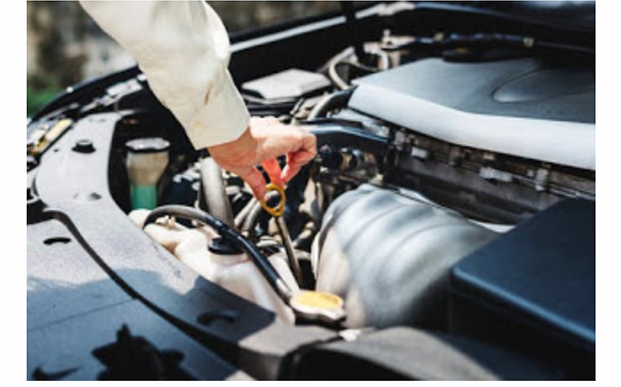Fashion/Lifestyle
10 Symptoms That Your Car Needs An Oil Change

Arguably, the engine represents the blood of every car. The engine needs oil to move the moving parts and ensure smooth operation. In fact, all kinds of engines need oil to work. It doesn’t matter if you use a motorcycle, a generator or even a lawn mower. If the engine is equipped, it must be lubricated with oil.
Below are the top 10 characters for your vehicle’s oil change
1.
Dark or dirty oil
If you have never seen pure, new engine oil, it has a bright yellow color. However, if the oil gets older and dirty due to the accumulation of residual particles in the engine, it becomes darker, almost black.
You should do the habit of regularly checking the
condition of the oil. Remove the dipstick and see the oil color. Or wipe the tip of the dipstick with a paper towel for a more accurate result. If the oil is dark brown or black, you must replace the oil.
2.
Tapping Noises
Engine oil is aging and it will take some time. That’s why car manufacturers recommend that you change every 5,000 miles or so. If your car has an old oil, it will probably become heavier.
This makes oil lubrication in engine parts more difficult. As a result, the engine produces a variety of metallic sounds because they do not lubricate properly.
3.
Burnt Oil Smell
When the cabin interior of your vehicle begins to smell of burnt oil, you know that you have problems with oil. This usually means that the oil will leak somewhere and the oil will fall into the hot parts of the engine.
This also means that there is probably too little oil in the engine and the engine overheats. Take care of oil spill immediately and pour in fresh oil.
4.
Smoke from the Exhaust
If you live in a cold environment, you are used to seeing steam in the vehicle’s exhaust gases. However, if you see blue or gray smoke from your exhaust, you probably have an oil leak.
This is accompanied by a burnt oil smell and the smoke resulting from the lack of oil in the engine to lubricate its parts due to leakage. Remove oil spill and replace oil.
5.
Car Stopping
If you drive and the vehicle stops, you may have a small problem or a bigger problem. A little problem would be if you have a clogged fuel filter or bad spark plugs. Something can be replaced with simple tuning. A bigger problem would be a bad fuel pump or a clogged catalyst that needs to be replaced.
6.
Poor Fuel Consumption
If you find that gas mileage is not what it used to be, it may mean that you are late for oil change. When the engine oil expires, it gradually becomes smooth and eventually becomes almost muddy if it is not changed. Thick oil gives more resistance to moving parts of the engine, making it harder and consuming more fuel.
Poor gas consumption can also be due to other reasons. However, if the oil is dark and much thicker than the new oil, a simple oil change will help.
7.
Overheating
If there is not enough oil in the engine or if the oil has not been changed for a while, the engine components cannot be beaten. This causes the engine to continue heating and eventually overheat. Changing oil with fresh oil often corrects the problem.
8.
Difficulty starting the engine
If you find it difficult to start the engine, you may need to check the battery connections for corrosion and clean them with a steel brush. If the battery is at least several years old, it may be time to replace the battery.
You may find that the engine hesitates before it starts when the dashboard lights get weak. Of course, you need optimization to clean the battery connectors and connectors, or even replace them with a new one.
9.
Warning lights
Vehicles and vehicle sensors nowadays make it easier to detect the problem before it gets worse. If the indicator light on the dashboard, check the owner’s manual for what this lamp means. Warning lights alert you to all kinds of problems, such as: Low battery, burned back light, transmission failure, etc.
Some of the newer vehicles even track the status of the oil (via sensors or set time slots) and tell when it’s time to change it. In some cases, the indicator light turns on. That’s why you need to use an OBD2 scanner to make the mechanic diagnose or check the problem.
10.
Reluctant postponement
If you are using an automatic vehicle, you should not have problems if your car is changing gear. However, delaying or slowing down the transfer may mean that you need new gear fluid or filters. Of course, it can also mean a worse problem. If you take the car for refurbishment, this will at least identify the problem.
POINTS TO NOTE:
It is always important to constantly monitor the oil in the engine, because its plays a vital role in terms of keeping the vehicle in a smooth motion.
Fashion/Lifestyle
Introducing “Atupaglowco” : Where Fragrance Meets Feeling; The Story of Our Beginning

Introducing “Atupaglowco”: Where Fragrance Meets Feeling; The Story of Our Beginning
Every great journey begins with a sense of anticipation. For us, it began with a simple belief that a space should do more than exist, it should speak comfort and glow.
In a world filled with noise, stress, and endless motion, we realized something powerful. Fragrance can transform not just rooms, but moods. A familiar scent can calm anxiety. A warm aroma can turn a house into a home. A gentle glow can bring peace after a long day. This realization gave birth to “Atupaglowco.”
Atupaglowco was not created to sell diffusers, room sprays, or candles. It was created to create experiences. To create moments. To create atmospheres where people can breathe, reflect, and feel whole again.
The name itself represents more than a brand. It represents warmth. It represents light. It represents presence. We remember the early days, the planning, the testing of scents, the moments of doubt, and the moments of excitement. Each candle poured was a step of faith. Each fragrance blended was a piece of our vision coming to life. We weren’t just building products; we were building something meaningful.
Our diffusers were designed to quietly fill spaces with elegance.
Our room sprays were crafted to instantly refresh and revive environments. Our candles were made to bring calm, beauty, and a soft glow into everyday life.
Atupaglowco was born from passion, patience, and purpose. This launch is not just the start of a business. It is the start of a movement to help people create spaces they love. Spaces that inspire rest. Spaces that inspire joy. Spaces that glow.
We believe fragrance is personal. We believe glow is emotional. We believe every space deserves both.
Today, we proudly introduce Atupaglowco to the world.
This is only the beginning.
Fashion/Lifestyle
Mrs Township Finalist 2026 Leads Community Action to Support Disadvantaged Learners

Mrs Township Finalist 2026 Leads Community Action to Support Disadvantaged Learners
As the 2026 academic year begins, hope and compassion are taking root at Theresapark Primary School, thanks to the remarkable leadership of Mrs Nkone Maringa, a respected community member and Mrs Township South Africa Finalist 2026.
In a powerful demonstration of grassroots leadership and social responsibility, Mrs Maringa, in partnership with Theresapark Sasol Garage, spearheaded a community clean-up of the school’s garden area. The initiative was carried out in preparation for the school’s feeding scheme garden, which will support disadvantaged children with fresh, nutritious produce throughout the school year.
Planting Seeds of Change
The garden project goes beyond beautifying the school environment. It is designed to become a sustainable source of food for learners who rely on the school feeding programme as a vital lifeline. By preparing the land ahead of the school reopening, Mrs Maringa and her partners ensured that planting can begin immediately, setting the tone for a productive and caring 2026.
“This project is about dignity, nutrition, and giving our children a healthy start to the year,” the initiative reflects—aligning perfectly with Mrs Maringa’s long-standing commitment to community upliftment.
A Record of Community Impact
Mrs Nkone Maringa’s involvement at Theresapark Primary School is one of several impactful projects she has undertaken in her community. Known for her hands-on approach, she consistently mobilizes local businesses, volunteers, and stakeholders to address real needs—especially those affecting children, women, and vulnerable groups.
Her work embodies the core values of the Mrs Township South Africa platform: leadership, service, empowerment, and positive social change. As a finalist for the 2026 title, Mrs Maringa continues to prove that true leadership is measured not by titles alone, but by tangible impact on the ground.
Corporate–Community Partnership in Action
The collaboration with Theresapark Sasol Garage highlights the power of partnerships between local businesses and community leaders. Their support played a crucial role in making the clean-up initiative successful, demonstrating how corporate social responsibility can directly transform lives at a grassroots level.
Looking Ahead
With the garden now prepared, Theresapark Primary School is set to launch its feeding scheme garden as learners return for the new academic year. The project stands as a symbol of hope, resilience, and collective effort.
As Mrs Nkone Maringa continues her journey as a Mrs Township South Africa Finalist 2026, her work at Theresapark Primary School serves as a shining example of how passion, partnership, and purpose can create lasting change—one garden, one child, and one community at a time.
celebrity radar - gossips
Beauty with Responsibility: Lindie Motswaeng’s Vision as Miss Classic Queen International

Living Authentically, Leading with Purpose: Lindie Motswaeng
Lindie Motswaeng is a 28-year-old Mathematics and Economics graduate from one of Africa’s leading institutions, the University of Botswana. She is currently completing an Executive Secretary (Finance) qualification at Boston City Campus in Pretoria. A woman of depth and versatility, Lindie enjoys cooking, travelling, exploring new ideas, spending time with family, and commanding the stage. Outspoken, open-minded, and deeply curious, she lives by a simple yet powerful motto: to live life on her own terms, unconfined by limitations.
As an aspiring economist, Lindie is passionate about women’s economic empowerment, particularly for women facing abuse, and about raising awareness around mental health—an often-silenced issue in many communities. She envisions a future where individuals are free to thrive beyond cycles of abuse and mental health challenges. Recently crowned Miss Classic Queen International, she shares her journey, values, and vision for her reign.
Congratulations on your crowning. How does it feel to emerge as the new Miss Classic Queen International?
It honestly feels surreal. It is always amazing when your hard work and dedication are finally recognised. I truly believe this organisation is going to help me make a meaningful impact during my year of reign.
Can you take us back to the moment your name was announced as the winner? What went through your mind?
I was quite blank at first—I simply could not believe it in that moment. Shortly after, it turned into overwhelming joy, especially seeing people, including the other ladies, cheering me on. It was such a beautiful and affirming moment.
What does the title Miss Classic Queen International represent to you personally and culturally?
For me, it is about being an inspiration in my own authentic way. It is important to seek your own unique path. We are all different for a reason, and Classic Queen International embraces that diversity. More importantly, it highlights the beauty in our differences and uses them to open doors and create opportunities.
How has your journey in the pageant world shaped the woman you are today?
My pageant journey has taught me to appreciate my abilities and to use them responsibly to create change in my community. This is a role I believe every human being has. Most importantly, it has taught me the value of sisterhood. In every competition, you meet women from different walks of life who always have something to teach you. Although it is a competition, it is vital to remember that there is life after it. Someone you meet may become a destiny helper or a lifelong sister.
Beyond beauty and poise, what core values do you believe this crown stands for?
As beautiful as the crown is, it symbolises duty. With such a platform, it becomes possible to make an impact on a much larger scale. It is also important to remember that you do not always need a crown or title to do good or to champion a cause close to your heart. When you genuinely have a heart for people and a willingness to be a voice for others, the responsibilities of the crown do not feel heavy.
Many young women look up to you already. What message do you hope to pass on to girls who aspire to follow in your footsteps?
The journey is never easy. There will be moments of doubt and discouragement, but it is important to remember why you started. Having a teachable spirit is also key—you can learn incredible things when you are surrounded by different personalities. Lastly, comparison can be tempting in competitions, but it is important to focus on your strengths and work on your weaknesses. Authenticity is essential; real growth cannot happen if you are constantly pretending to be someone else.
What were some of the biggest challenges you faced during the competition, and how did you overcome them?
I became ill on the second day, which is not ideal when activities require high energy and full dedication. Fortunately, I was part of an organisation that truly cares about its contestants. They ensured I received proper medical care and were very understanding. Maintaining a positive mindset also helped, because everything starts in the mind.
Pageantry today goes beyond glamour. What social cause or humanitarian project are you most passionate about championing during your reign?
I plan to continue my Art for Awareness project, which I started in 2021. The project uses art as a medium of communication and a form of release for people facing mental health challenges. In our culture, people are often silenced when they try to speak about their struggles, which causes them to withdraw. Art is universal and not age-specific, making it a powerful tool for expression.
How do you plan to use your platform as Miss Classic Queen International to create meaningful global impact?
I hope to expand my cause to other parts of Africa. This brand represents the continent, and with that comes the opportunity to partner with other organisations for wider reach and influence.
In your view, how can pageantry contribute to empowering women and promoting positive change in society?
We sometimes become too fixated on popularity and physical beauty, losing sight of what pageantry is meant to achieve. Beauty goes beyond the physical and is subjective. Women should be allowed to represent themselves authentically, without a single definition of beauty. We should also focus on developing their attributes, as these ultimately benefit society. A pageant queen has a voice and a platform, which requires humility, courage, and empathy.
Who or what inspired you most on your journey?
The love and support from my family, friends, and my country carried me throughout this journey. It truly takes a village. I was intentional when I started this path, knowing there would be challenges. When you set your mind and heart on something you are deeply passionate about, you will achieve it.
How do you balance confidence and humility while carrying such a prestigious international title?
I was raised with the principle of Botho, a core value in my country that embraces kindness, dignity, respect, and humility. When I stand on stage, I understand that I represent not only myself, but also my family and my nation. My character must reflect that. While humility is important, I should never shrink myself. As Nelson Mandela said, playing small does not serve the world.
What role do culture, elegance, and tradition play in the Classic Queen brand?
African culture plays a vital role in shaping character. This platform celebrates Africanism by allowing women from different African countries to showcase their cultures and talents on a continental stage. It fosters cultural exchange, promotes unity, and deepens understanding. Embracing our diversity as Africans allows us to see beauty instead of division. I learned so much from the other ladies—it was inspiring to see glamour fused with Africanism.
What should the public expect from you during your reign as Miss Classic Queen International?
I hope we can work together in championing this cause, because collaboration is essential. While I hold the title, greater impact can be achieved when we unite. I am grateful to be part of an organisation that supports and guides me throughout my reign to ensure we create positive change.
Finally, where do you see yourself after your reign, and how do you hope to be remembered?
I hope to be remembered as proof that anything is possible when you set your mind to it. I want to leave a legacy that inspires the next queen to do even more with the platform. Ultimately, I hope to help build a strong and enduring Classic Queen International family that extends beyond my reign.
-

 celebrity radar - gossips6 months ago
celebrity radar - gossips6 months agoWhy Babangida’s Hilltop Home Became Nigeria’s Political “Mecca”
-

 society6 months ago
society6 months agoPower is a Loan, Not a Possession: The Sacred Duty of Planting People
-

 society5 months ago
society5 months agoReligion: Africa’s Oldest Weapon of Enslavement and the Forgotten Truth
-

 news6 months ago
news6 months agoTHE APPOINTMENT OF WASIU AYINDE BY THE FEDERAL GOVERNMENT AS AN AMBASSADOR SOUNDS EMBARRASSING




















You must be logged in to post a comment Login